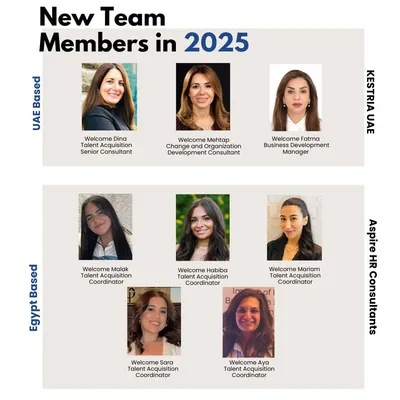
Kestria UAE and Aspire HR Consultants are delighted to announce the addition of exceptional new members to our ever-growing family. These talented professionals bring diverse expertise, deep passion, and innovative ideas to our mission of transforming HR and talent acquisition across the region.
The new team members joining us are:
Dina Kamar – Talent Acquisition Senior Consultant, Kestria UAE
Mehtap Arslan – Change and Organization Development Consultant, Kestria UAE
Fatma Gouarab – Business Development Manager, Kestria UAE
Ola ElSheikh – Special Projects Manager, Aspire HR Consultants
Habiba Tamer, Malak Embabi, and Mariam Amin – Talent Acquisition Coordinators, Aspire HR Consultants
Aya Fahmy – Talent Acquisition Coordinator, Aspire HR Consultants
Sara Hesham – Talent Acquisition Coordinator, Aspire HR Consultants
Each new member brings a unique set of skills and experiences that will strengthen our ability to deliver innovative and client-focused solutions in HR, talent acquisition, organizational development, and business strategy.
A Message of Gratitude
While we are thrilled to welcome these outstanding professionals to our family, we also want to take a moment to express heartfelt gratitude to our current leaders and team members. Their dedication, leadership, and unwavering support have been the cornerstone of our success. It is their spirit of collaboration and excellence that creates an environment where every new member feels welcomed and empowered to thrive.
Looking to the Future
As we embark on this new chapter, we are confident that our growing family will continue to set new benchmarks of excellence and innovation in HR and talent acquisition. Together, we will continue to empower businesses and individuals to achieve their full potential.
Welcome aboard to all our new team members! We look forward to celebrating future successes and creating impactful moments as one united family.
About Kestria UAE and Aspire HR Consultants
Kestria UAE and Aspire HR Consultants are industry leaders in talent acquisition, HR consulting, and organizational development. With a commitment to delivering innovative and client-centric solutions, we help businesses and professionals unlock their potential and achieve sustainable growth.
2025 New Members
Kestria UAE & Aspire HR Consultants welcome their new Team Members in 2025
At Kestria UAE and Aspire HR Consultants, we believe in building more than just a workplace – we’re building a family united by shared values and a commitment to making a difference. I am deeply grateful for our incredible team, whose support and guidance ensure that our new colleagues will experience a smooth and warm integration into our organization.



















